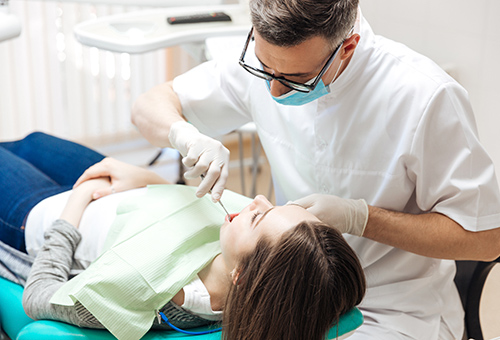Overview
Dentures are one of many dental services we offer. They are removable dental appliances designed to replace some or all teeth in a dental arch. When an individual loses their teeth, their jawbone remodels and shrinks over time. This can make it difficult for their denture to fit snugly and comfortably. Dentists found that by attaching the denture to the remaining teeth in the mouth or dental implants. They could better stabilize it. This appliance is called an overdenture.
The Benefits
An overdenture is a complete or partial denture that sits on top of or is attached to underlying tooth structures or dental implants, according to a study in the Journal of Oral Research and Review. Overdentures can reduce shrinkage of the jawbone and redirect forces and pressure in the mouth, helping the dentures stay stable. For patients with dental-related conditions, such as cleft palate, oligodontia (absence of more than six teeth in primary, permanent, or both types of teeth). Or cleidocranial dysostosis (abnormal development of bones in the skull and clavicle area). And Class III occlusion overdentures may be especially useful.
To ensure that the patient has an appliance that will last. In general, overdentures provide improved function and retention compared to conventional dentures, which may become unstable over time or require refitting. Overdentures, made from acrylic, can help preserve the surrounding bone. Like other dentures, overdentures are removable.
Tooth-Supported Overdentures
Overdentures can be placed in over-retained teeth or dental implants. If the patient has teeth present, overdentures may be a good option because the appliances may not require teeth extraction. A procedure that can make some patients anxious. With this treatment, they can rest assured that they are retaining some of their natural teeth.
Most commonly, overdentures are supported by canine teeth. The teeth undergo root canal treatment. After which, they are connected with a metal bar. Or kept individually with an attachment placed on them that fits into the base of the overdenture. This can be done for both the upper and lower jaws.
Implant-Supported Overdentures
Some dentists consider it more predictable and cost-effective to use two dental implants to support overdentures instead of two natural teeth. Keep in mind that upper or lower dentures — if still in good condition — can be converted to overdentures supported by dental implants. The dentist will place implants where the canines used to be. Then the implants can be connected with a metal bar or be individually restored with an attachment that fits into the overdenture.
Overdenture Care
To avoid developing cavities and gum disease. Patients with overdentures must maintain a thorough oral hygiene routine, reports the Journal of Oral Research and Review study. They should remove the dentures at night and clean around all the attachments in the mouth. It’s best to follow the advice of your dentist and see them for regular checkups and professional hygiene appointments. To ensure your gums remain healthy and your appliance fits well.
If you will be getting your first set of dentures, discuss the option of overdentures with our dentist. The dentist will help ensure that you make the best decisions for your oral health and guide you on how to best care for your new smile.
More Bothell Dental Services:
Emergency Dental Treatment
Emergency Dental Treatment Do Not Wait, Call (425)-778-4445 Now If it's a real emergency, please call 911 or during non-office hours call...
READ MORENO DENTAL INSURANCE? NO PROBLEM.
The best deal we have to offer is our DAT SAVINGS PLAN. This plan covers one, two, or the entire...
READ MORE